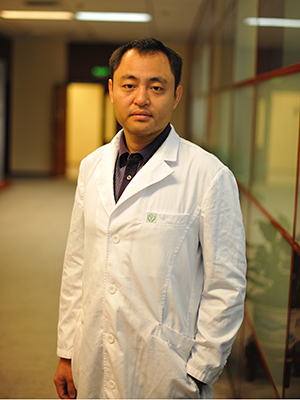|
Cao Guang: the Chinese doctor working closest to Ebola virus
Cao Guang, born in February 1972, is a surgeon at Anzhen Hospital in Beijing. He was awarded a high morality prize and won the reputation of "the most beautiful doctor" in 2014 due to his outstanding contributions to the health care in Guinea, Africa. The Ebola virus, highly infectious and deadly, has led to more than 2,700 deaths in the world, with West Africa suffering the most. China sent a medical team composed of 19 doctors and nurses to Guinea; Cao Guang was one of them. He has spent 703 days treating patients, including those diagnosed with Ebola, which means he became the Chinese doctor working closest to Ebola. Cao risked his life to perform more than 200 operations on African patients, since six Guinean doctors and nurses died from the virus. Inspired by his wife, who is also an excellent doctor, Cao is optimistic and brave enough to complete his task smoothly, and has gained broad respect from the local people. "I felt quite relieved and relaxed when I was out of quarantine," said Cao in an interview, "but I can still recall the frightening memory of treating the first patient contracting Ebola. He was conscious when he was sent to our hospital on the first day, but on the second day he became out of control with blood leaking out of his body and soaking the sheet.His eyes were also filled with blood, just like rabbit. At that same time, Ebola virus was strange to Guinean government and people because it was the first time that Ebola broke out in Guinea. It was not until March 22 that Ebola was found to be source of epidemic when many more people and doctors were infected with the virus." According to research, Ebola virus can be infected via blood, spit, urine, excrement, vomit and even sweat with symptoms of fever, serious diarrhea and vomiting. Causing 90 percent of infected patients to die, Ebola is believed to be much more deadly and dangerous than AIDS and SARS. Due to direct contact with the Ebola patient, Cao was required to be put under quarantine for 21 days. When told about the quarantine order, he struggled with himself because he was unwilling but had to obey. "We were all nervous about his health because of the backward medical care in Guinea. However, he was always in a good mood when he met with us," said Cao's colleagues. Although trying to be as positive as possible, Cao told his condition to his wife, who kept the secret from Cao's parents and their 9-year-old son. "Our parents were so worried about his health that they could hardly fall asleep at night when they heard about the news from TV. And Zhuangzhuang, our son, also wept at the worrisome news and prayed for the good health of his father every day," recalled Cao's wife. "Cao is a tough guy," said Kong Qingyu, leader of the medical team. "He seldom revealed his worry and anxiety during the quarantine, but I noticed his craving for good health by observing him exercise more frequently and take medicine, improving immunity against the virus." Cao still has deep grief at the death of a Guinean doctor who had worked with him at the hospital. "We are strongly bonded with each other, Chinese and Guinean doctors, like brothers and sisters. I can hear his voice echoing around my ears, it sounds like he never passed away, " said Cao with tears in his eyes. It is hard to imagine the living conditions and health care of Guinea, one of the most underdeveloped countries in Africa. Power failure is so common that medical teams have gotten used to it and learnt to have supper in the dark. "Power failure often took place when we were performing operations, in which case we had to use mobile phones, electric torches or any other lighting. I remember once flashlights were used from beginning to the end of an operation." In Guinea, the Ebola virus was not the only threat to doctors' life but also riots, violence and assassination. "Our ambulance car was once barricaded on the road when rebellious troops smashed the window with rocks," recalled one of the medical team members. For nearly two years the medical team has been dedicated to their duties, winning respect and compliments from local people. "They give full credit and are especially friendly to Chinese and many of them could say "Hello" or "Goodbye" to us in Chinese," said Cao proudly. Every year, thousands of doctors like Cao Guang are sent to Africa to help those most in need. Their commitment, sacrifice and professional ethics establishes the bridge between China and African countries, and presents a positive image to the world of a country taking responsibility and safeguarding peace. |
| Copyright © China.org.cn. All Rights Reserved 京ICP证 040089号 京公网安备110108006329号 网络传播视听节目许可证号:0105123 京公网安备110108006329号 京网文[2011]0252-085号 |

 0
0 








Go to Forum >>0 Comment(s)